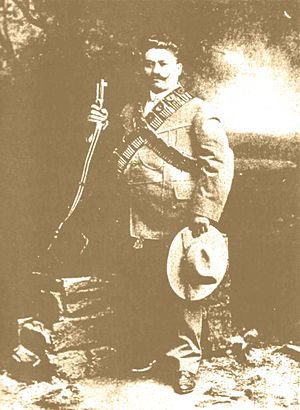Otilio Montaño Sánchez facts for kids
Quick facts for kids
Otilio Montaño
|
|
|---|---|
 |
|
| Born | 30 December 13, 1877 Villa de Ayala, Morelos, Mexico |
| Died | 16 May 18, 1917 (aged 39) Buenavista de Cuéllar, Guerrero, Mexico |
| Allegiance | Liberation Army of the South |
| Years of service | 1910–1916 |
| Rank | General |
| Battles/wars | Mexican Revolution |
Otilio Montaño Sánchez (born December 13, 1877, in Villa de Ayala, Morelos, Mexico – died May 18, 1917, in Buenavista de Cuéllar, Guerrero, Mexico) was an important general in the Zapatista movement during the Mexican Revolution. He was a close advisor to Emiliano Zapata and helped shape the goals of the Zapatista movement.
Contents
Early Life and Education
Otilio Montaño was born in 1877 in Morelos, Mexico. His parents were Esteban Montaño and Guadalupe Sánchez. He finished his studies in Cuautla.
After his schooling, he became a teacher. He taught in schools in Tepalcingo, Jonacatepec, and finally Ayala. In Yautepec, he met Amador Salazar, who was a cousin of Emiliano Zapata.
Joining the Revolution
In 1910, Otilio Montaño supported Francisco Madero. Madero was fighting against the long-time president, Porfirio Díaz. Montaño later joined Felipe Neri and Amador Salazar. Together, they helped form the Zapatista movement in Morelos.
Most of the Zapatista soldiers were farmers. Because Otilio Montaño had been to school and worked as a teacher, they saw him as an "intellectual." This meant he was respected for his knowledge and ideas.
The Plan of Ayala
After Emiliano Zapata stopped supporting Madero, Otilio Montaño stayed in Morelos. In November 1911, he worked with Zapata to create the famous Plan of Ayala. This was a very important document for the Zapatista movement.
Zapata told Montaño what he wanted to say. Otilio then wrote down the words and checked them carefully. This plan outlined the Zapatistas' goals, especially their demand for land reform.
A Key Zapatista Leader
When Victoriano Huerta took power from Madero, Montaño fought against Huerta. He became a member of the Zapatista ruling council, also known as a military junta. Emiliano Zapata led this council.
Other important members included Eufemio Zapata, Genovevo de la O, Felipe Neri, Amador Salazar, and Manuel Palafox. Palafox served as the secretary for the group.
Meeting Pancho Villa
In December 1914, Montaño went with Zapata to a special meeting. This meeting was with another famous revolutionary leader, Pancho Villa. It took place in Xochimilco.
At this meeting, Otilio Montaño gave the welcoming speech. He introduced Zapata and Villa to each other. This was a significant moment in the Mexican Revolution, bringing two major leaders together.
Final Years and Tragic End
In early 1917, Otilio Montaño had disagreements with some other Zapatista generals. Because of this, he was sent to the town of Buenavista de Cuellar. Soon after, a rebellion against Zapata started in that town. This rebellion supported Venustiano Carranza.
Montaño was put in charge of stopping the rebellion. Even though he had the leader of the revolt executed, he was accused of actually leading the rebellion himself. He strongly said he was innocent. However, influential Zapatistas like Manuel Palafox and Antonio Díaz Soto y Gama argued that he was guilty.
Zapata let his advisors decide the matter. A "Revolutionary Tribunal" was formed. Palafox and Soto presented evidence against Montaño. Most of this evidence was indirect. Montaño, in turn, accused them of betraying the Zapatista revolution.
After being found guilty, Otilio Montaño was executed on May 18, 1917. He continued to declare his innocence until the very end.
See also
 In Spanish: Otilio Montaño Sánchez para niños
In Spanish: Otilio Montaño Sánchez para niños
 | Selma Burke |
 | Pauline Powell Burns |
 | Frederick J. Brown |
 | Robert Blackburn |

